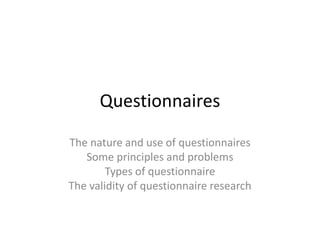
Questionnaires (AS Sociology Research Methods)
- 1. Questionnaires The nature and use of questionnaires Some principles and problems Types of questionnaire The validity of questionnaire research
- 2. The nature of use of questionnaires • Respondents supply answers • Filling in responses (self-completion questionnaire) or giving information to an interviewer (face-to-face or telephone) • Cheap, fast and efficient • Main tool of measurement in positivist sociology • Easily quantified, can be analysed more ‘scientifically’ than qualitative data • Positivism – approach in sociology that believes society can be studied using similar scientific techniques to those in the natural sciences, such as physics, chemistry and biology
- 3. Pilot survey • Must obtain comparable data • Questionnaires can’t be changed once survey has begun • Pilot studies are used to test questions, make sure their meaning is clear, and to ensure layout and wording are suitable for the intended sample • Important to clear up problems ad avoid wasting time and money on poorly designed questionnaires
- 4. Designing a questionnaire • As short as possible, with clear layout and instructions • Clear and neutral language, and the avoidance of ‘leading questions’ • Confidentiality
- 5. As short as possible, with clear layout and instructions • Clearly laid out and well printed • Easy to follow and fill in • Minimum questions required – respondents may be unwilling to answer long lists of questions, or may stop giving serious thought to their answers • Simplest questions first and complicated questions at the end – not put off right away • Enough alternative answers (including ‘don’t know) for correct expression of views
- 6. Clear and neutral language, and the avoidance of ‘leading questions’ • Questions should be capable of being answered ‘yes’, ‘no’ or ‘don’t know’ • Neutral terms so respondents don’t feel like they need to give a particular answer. Leading questions do this, and are likely to produce distorted/invalid results e.g. ‘Why do you think promiscuous sex is wrong?’ encourages people to accept that is wrong • Simple, everyday language so people understand • Time options rather than ‘Do you watch TV a lot?’ • Only questions they are likely to be able to answer accurately should be asked (expected to know about, able to remember) • Questions should mean the same thing to all respondents • Offensive questions should be avoided
- 7. Confidentiality • Those being surveyed should be reassured that their answers will be kept confidential or anonymous
- 8. Types of questionnaires • Pre-coded or closed • Open-ended or open • Postal/mail or online self-completion
- 9. Pre-coded or closed questionnaires • Structured • Multiple-choice • Pre-set closed questions • Limited number of multiple-choice answers
- 10. Advantages and disadvantages of pre- coded or closed questionnaires Advantages Disadvantages • Quick to complete • Produces standardized data; easily classified and produced in quantitative statistical form • Reliable (likely to produce similar results if carried out by another researcher) • Data collected can produce new theories or test existing ones • Enables comparisons between different groups and populations – answering the same questions • Meaning of questions may not be clear to some respondents • Extra questions cannot be asked or added for respondent's to fully explain their answers • Imposition problem – risk that the researcher, when asking questions, might be imposing their own views or framework on the people being researched, rather than getting at what they really think
- 11. Open-ended or open questionnaires • Unstructured • Pre-set questions though no pre-set answers • Individuals write their own answers or dictate them to the interviewer
- 12. Advantages and disadvantages to open-ended or open questionnaires Advantages Disadvantages • More valid date – respondent able to express their true view rather than having to pick from what the researcher considers important views. Imposition problem is less • More detail and depth to the answers • Difficult to classify and quantify the results – answers may be unclear to researcher, researcher may be biased when interpreting meaning of answer • Wide variety of answers difficult to compare results with other similar research
- 13. Advantages and disadvantages of postal/mail or online self-completion questionnaires Advantages Disadvantages • Cheap compared to interviews • Data can be collected from a wide geographical area for cheaper cost • Results quickly obtained – most that get returned are returned within a couple of weeks • People can reply at leisure and not just when an interviewer is present – more precise answers • Questions on personal, controversial, embarrassing or sensitive issues (e.g. depression, stigmatized diseases like HIV and AIDS) can get better result because interviewer is not present • No interviewer bias – answers being influenced by presence of interviewer • Non-response (50% response is considered good) • Unrepresentative sample – only people interested or educated on the topic may take part • Questions may be interpreted differently – no interviewer present to explain questions • No way of knowing the right person completed the questionnaire
- 14. The validity of questionnaire research Imposition • Imposition problem • Researchers have already decided what the most important matters are • Impossible for respondents to express feelings and subtle shades of opinion in statistical form • Impossible to measure subjective factors such as nature and strength of religious belief Validity • No guarantee that people will tell the truth • Different meanings attached to the wording of questions e.g. people would rather consider themselves ‘middle class’ than ‘lower class’ but if given the option of ‘working class’ that is what they’d pick • Researchers need to be aware of how such meanings may differ between classes, ethnic groups, age groups, etc.